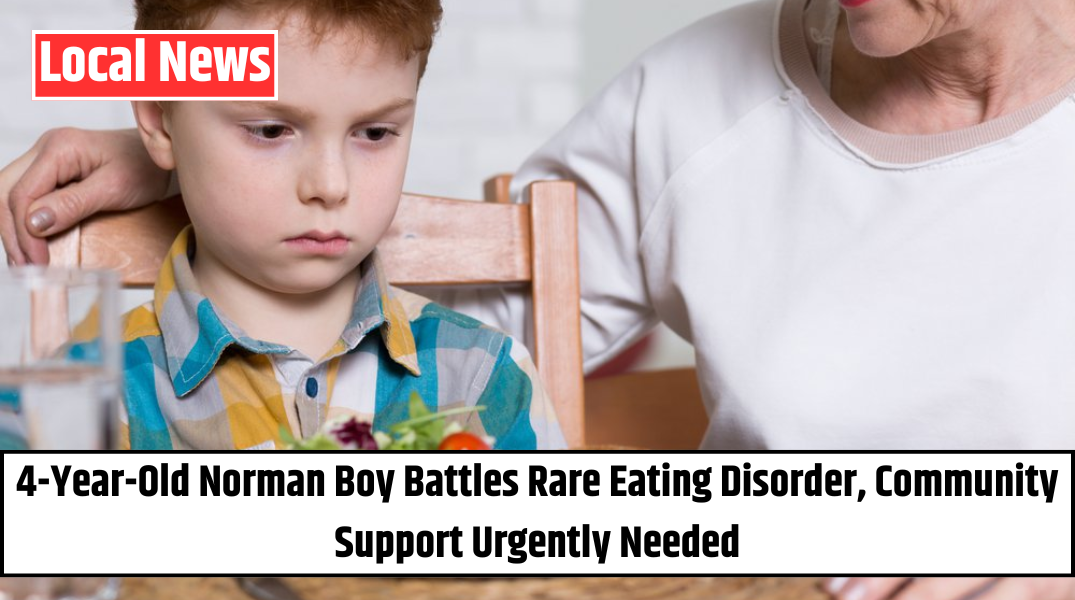In Norman, Oklahoma, a resilient 4-year-old named Gordon Carlson is preparing for a journey that could change the course of his young life. Diagnosed with Avoidant Restrictive Food Intake Disorder (ARFID)—a rare and complex eating disorder—Gordon will soon travel out of state to receive specialized care unavailable locally. The process promises hope, but also comes at an emotional and financial cost for his close-knit family.
A Disorder Beyond “Picky Eating”
Unlike typical food aversions seen in childhood, ARFID is a serious disorder. For Gordon, eating is not a joyful experience—it’s a mechanical necessity. Since he was 18 months old, he’s been in feeding therapy, and as he nears his fifth birthday, his primary diet still consists of baby food blended with nutritional formula, fed to him by spoon.
His mother, Samantha Carlson, emphasizes the severity of the condition:
“People hear ARFID and think of picky eating, but this is entirely different. Gordon doesn’t chew. He doesn’t explore food. He doesn’t even talk during meals—it’s robotic.”
Gordon has only recently expanded his list of acceptable foods to include Goldfish crackers, veggie straws, Honeycomb cereal, and apple juice. Still, these are rare victories in a daily struggle that few understand.
A Bright Spirit with Big Challenges
Despite his feeding challenges, Gordon is a joyful child with a curious and vibrant personality. He shares a special bond with his twin and is described by his parents as having high musical intelligence.
“He lights up when he hears music, and he loves being outside—especially on the swing set. He’s fascinated by planes and trains,” said Samantha.
Also Read – Missing 7-Year-Old Paddleboarder Found Safe—His First Question Surprises Rescuers
In addition to ARFID, Gordon has also been diagnosed with autism, making his care particularly complex. His treatment plan includes multiple therapies that aim to work together—an interdisciplinary approach—with the hope of tackling his eating disorder in a holistic way.
The Warning Signs That Went Unnoticed
Like many parents, Samantha didn’t recognize the early warning signs of ARFID.
“When Gordon was a baby, he never went through that stage of putting toys in his mouth. At first, I thought I was lucky—no choking hazard! But now I know that was a red flag.”
As a first-time mom, she didn’t realize Gordon’s avoidance of oral exploration pointed to a deeper sensory issue.
A Family Divided by Distance and Necessity
Gordon’s family has now made the difficult decision to send him for a two-month inpatient treatment program at a specialized hospital out of state. The move is necessary, as Oklahoma currently lacks intensive ARFID treatment options.
“It’s going to split our family in half,” Samantha shared. “While one of us stays with Gordon, the other will stay home with our other children. And all our expenses—food, housing, gas—will double.”
The treatment is intensive, with Gordon expected to receive more therapy in a single day than he usually gets in an entire month.
How You Can Help
While Gordon’s medical journey is challenging, it’s also full of hope. His family is exploring avenues for support and welcomes any community encouragement, resources, or financial assistance to ease the burden.
Also Read – 6 Women Caught in Kohl’s Theft Spree, Macedonia Police Say
In a world where children with invisible illnesses are often overlooked, Gordon’s story is a reminder of the importance of early intervention, awareness, and compassion.
Meet the Reporter: Elizabeth Fitz
Elizabeth Fitz, a member of the News 9 team since October 2024, is committed to telling stories that matter. With a passion for investigative reporting and a heart for education and public safety, she aims to shine a light on families like the Carlsons—giving voice to their struggles and strength.

